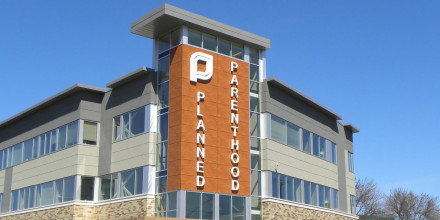Jim Daly: Hi, I’m Jim Daly. On today’s Focus on the Family, we’re going to address the topic of abortion especially as it relates to our present challenges with the coronavirus. John Fuller is here with me, but not in the same studio. John, you have me?
John Fuller: We’re practicing our social distancing.
Jim: (Laughter) That’s good. John, this topic reminds me of the ancient wisdom found in the Old Testament book of Psalms where King David wrote about evil men saying, quote, “You love evil more than good and lying more than speaking what is right.” That’s right out of Psalm 52:3. The reason these words are so relevant is because of the double-standard we have today with abortion. For some reason, in many states across this nation the rules simply don’t apply when it comes to abortion even when we’re facing this pandemic. As a result, we’re not only killing precious babies, but we’re also harming women and putting our communities at greater risk because of political and I believe financial agendas. And that’s simply unconscionable and that’s why we’re talking about this today on Focus on the Family.
John: Yeah, we’ve always been pro-life as an organization and we often address pro-life issues, but, uh, today’s circumstances with the pandemic, Jim, make this all the more timely for us to cover.
Jim: It does. And let me remind folks that, uh, we had planned for our ALIVE 2020 event to be on May 9th. Obviously, we’ve had to move that. We’re going to aim that for some time in the Fall, perhaps September. So, just keep your eye on that. We’re going to continue to build toward that event and we want to host that event in the five cities that we have talked about. So, just stay tuned. We’re going to keep pressing ahead to accomplish that. But know for sure that we are steadfast in our beliefs that all human life is created by God and designed in His image. Again, just like Genesis talks about. Therefore, for the elderly, for those with special needs, the pre-born, you are valuable. You’re made in God’s image. We believe in that and we are gonna fight for you.
John: And our guests today totally agree with that. We have two medical doctors with us by phone. Dr. David Hager who has been working as an OBGYN since 1978 and currently serves with the Baptist Health Medical Group in Lexington, Kentucky. Dr. Hager has been advising Focus on medical issues since 1994. He’s a member of our Physicians Resource Counsel. And we also have Dr. Bill Lile with us who is a very buy OBGYN. He’s delivered more than 4,000 babies and he proudly promotes his pro-life values at his website prolifedoc.org. And we’re really honored to have these two men with their convictions and their expertise joining us today.
Jim: David and Bill, welcome to Focus on the Family.
Dr. David Hager: Thank you so much for having us
Dr. Bill Lile: Thank you very much.
Jim: Well, gentleman, before we get into specifics on this issue of abortion and the states and how each state is applying this and the federal judges that are getting involved, first, if I can ask, how are you doing? What’s happening in the medical profession when it comes to this coronavirus? What are your days like? Paint a picture for us, Bill.
Dr. Lile: Well, I went in on call on Friday morning and I didn’t leave the hospital until Monday around noon. We are holding our own. We are busy. We’re not as busy here in Florida as they are up in New York. We’re working with, uh, the health departments. We get updates every 12 hours from our health departments. But we’re holding our own. And this is what we trained for and I think the health community is just shining through.
Jim: Right. David, how are you doing?
Dr. Hager: Well, we’re doing well. There’s an awful lot of stress on the medical community and I really want to honor our first responders, uh, who’ve – who are really on the front lines. But, uh, we’re doing everything we can to limit visitation in the hospital. We’ve shut down our out-patient surgery center and only running our main operating room. We don’t allow visitors to come into the hospital. They – they wait outside and then we inform them of surgical outcomes and so forth. So, it’s really a new day adjustment for us. Um, and in the state of Kentucky we’re over 300 case now and we’ve had 10 deaths.
Jim: Mm. Well, that’s the toll that medical professionals are enduring and, of course, the nation – many of us are sheltered-in-place, et cetera. Um, you mention the prioritization, Dr. Hager. Let’s get into that a little bit because it kind of sets premise for the broadcast today. The idea of emergent care, urgent care, and elective care. Give us a more definition on how the medical professions, right now – how you guys are looking at these cases and deciding what needs to happen and what doesn’t happen. Specifically related to women.
Dr. Hager: Um, we’re designed to – to work as Bill will testify. We’re designed to go. We’re designed to do. We’re designed to and committed to try to save lives and to intervene. But now we’re being told, for example, that all elective surgery is canceled. And so, the division is in to emergent which is an immediate threat of loss of life, limb, organ, or permanent disability. That would be a ruptured appendix with peritonitis, a bowel obstruction not responding to medical management, an aneurysm about to rupture. Urgent is a threat to loss of life, limb, organ, or permanent disability, and/or a necessity for progression of treatment for life, limb, organ, or disability within 30 days. So, we’re saying that if something isn’t done fairly soon then we’re going to have a major problem. Those would be most of our malignancies that require immediate treatment, obstetric procedures, persistent bleeding and so forth. And an elective is where treatment is necessary but may be delayed for at least 30 days or if the surgery may be remediated by medical therapy. And so, many, many, elective procedures are being canceled. And I have to do that as the Chief of Service for our outpatient service. And the – the physicians by and large have been very understanding and very cooperative and not wanting to bring patients into potential contamination and infection.
Jim: No and that – I appreciate that clarification because again in the debate – the national debate or discussion about who is receiving care – that helps clarify how that’s done. Bill, let me ask you, the national debate if I can go that – the eruption over whether abortion should be considered essential healthcare or not. Certain states, Texas, Ohio, and three or four others, have made that decision to postpone what they are describing as elective surgery with abortion. I think a federal judge just the other day now has stepped in to, uh, to say, “No. These states have to continue to provide abortion.” I think in my – in my assessment this shows the glaring contradiction where you have doctors, you, saving life, helping a mother who has a stressed pregnancy, helping to save that baby’s life. And then these governors who are pressing ahead and these federal judges who are saying, “No. Taking life through abortion is necessary right now.” It seems like such a glaring contradiction, Bill.
Dr. Lile: Several governors have stepped in and said, “You know what? We’re canceling certain cancer surgery.” I have a good friend up in Nashville who just got diagnosed with prostate cancer and they have said, “Hey, maybe sometime in May.” So, now he’s dealing with knowing that he has prostate cancer, but he can’t get his surgery for another four to six weeks. But judges have overruled the governors. You know, just yesterday, Texas, Ohio, Alabama, put one to two week pauses on what the governors said was the right thing to do. No. 1 it’s not medically necessary to take the life of a baby. They are using, uh, personal protective equipment. They are using the facilities and they’re exposing their patients and their staff to possibly COVID-19. So, from a healthcare standpoint, it’s all about patient care. Are the pre-born a patient? Yes, they are.
Jim: Doctor Hager in that regard – I mean, painting that picture for us, where these abortion clinics remaining open, to Doctor Liles point, they’re coming in, they’re sitting in these waiting rooms, not managing that social distancing that’s required right now. Speak to that environment.
Dr. Hager: Yeah, well you’re exactly right. There is not social distancing. Patients are flocking in, um, Louisville, for example, here in Kentucky, there have been 385 abortions done in March. And there have been 10 COVID-19 deaths in the state of Kentucky. So, multiply that. The – the procedure forever has been called elective abortion. That’s the term that is used by abortionists, “We’re doing elective abortions.” Indicated abortion when the mother’s life is at stake which is – is rare. So, by definition it’s an elective procedure where there’s at least one death, as Bill has said, for every surgical procedure that’s done. They American College calls, uh, it an “essential component of comprehensive healthcare” and says, “a delay may make it inaccessible.” I – I’d kind of turn that around and I would say, “It is a comprehensive component of an elective procedure because a child’s life is lost every time an abortion is done.”
Jim: Well, that’s the point. And I think from your perspective – both of you, and Bill, I’ll ask you to go first – why do you think the abortion advocates are fighting so hard to keep abortions going through this pandemic? Is there not any, uh, ray of hope in them to say, “Okay, you know what? Right now, we should suspend this for the benefit of the broader culture, the broader society.” So your friend can get his cancer treatment or his cancer surgery – that kind of thing. I mean, do they not see it? Are they that blind?
Dr. Lile: I think what they are focusing on is that if they compromise at all, then we have the advantage. If they compromise on gestational age limits, then we can say, “Oh, so you agree there is a time when an abortion is wrong.” If we look at a medical emergency like we’re all facing now and if we say, “Oh, there is a time when abortion is wrong” then that gives us an upper hand where there are times when abortion is wrong. So, they will say, “Abortion is right at any gestational age for any reason despite the fact that there’s a pandemic going on worldwide.”
Jim: Yeah.
Dr. Hager: And I think Bill is exactly right. But, uh, there’s another factor I believe, Jim, that’s involved here and that’s the financial factor. This is a big money industry and if we put this on pause for 30 days, what’s going to happen with funding and are people going to realize, you know, “I can give birth to this baby. I didn’t have to abort this child.”
Jim: That is true. And I think the – the glaring hypocrisy again – if they just stand down, oh, guess what? A baby is born, and that baby is human, and that baby gets all the rights that everyone should enjoy including the pre-born. And that’s the issue. Bill, you said something to me I want you to repeat. I think it was at dinner when we had that great meal in Washington, D.C. a few weeks ago. But, on this question, is abortion ever a med – a medical necessity? Your answer was so powerful. How do you respond to that?
Dr. Lile: Well, there are times when we need to deliver a baby early. That’s why we have – we just spent seventy million dollars on a high-risk pediatrics center. So, there are times when we need to deliver a baby early and give that baby every opportunity to do well in our intensive care nursery. But is there a reason to take the life of that baby during the process of delivering that baby early? No. You know, we look at, uh, what’s going on with – even Governor Cuomo – comes down to patient care. And Governor Cuomo last week said that he wouldn’t accept the premise that human life is disposable. Well, that’s exactly what abortion says. It says, “This is human. This is life. But it is disposable.” And we’re here to say that, “These are patients. They are not disposable. And we’re also here to help those women who are facing a lot of stress right now.” And to let them know that this pregnancy will not put them at an elevated risk like we saw with the H1N1 flu. We don’t have any evidence that this virus can cause birth defects like we saw with Zika. We’re here to support them. We’re here to support them emotionally, physically, physiologically, and spiritually.
Jim: Specifically, even when it comes to the health of the mother which is often the out-clause for the abortion industry, you said something again that was profound which is as an OBGYN you’ve never seen the taking of the babies life as the health of the mother needs if she’s in distress. Repeat that for me.
Dr. Lile: Correct there are time where we need to deliver the baby early like with severe preeclampsia or eclampsia. These are medical condition that are effecting the lives of both the mother and the baby. However, deliver the baby? Yes. Take the life of the baby? There’s no way that taking the life of the baby will help the health of the mother. If an emergency c-section is needed, I can have that baby out in less than 30 seconds. That will not hinder the health or effect the health of the mother.
John: Our guests today on Focus on the Family are Dr. David Hager and Dr. Bill Lile. We’re so grateful for their hearts and their work. And you can find out more about how you can be a pro-life voice. We’ve got a lot of resources at our website including a new I Am Pro-Life Prayer Guide. It’s all available at focusonthefamily.com/broadcast. Or call 800, the letter A, and the word FAMILY.
Jim: Dr. Hager, let me ask you to explain why the coronavirus is increasing abortions in the country right now and how – how are the pro-abortionists – the clinics – how are the preying on the fear and vulnerability? We’ve alluded to it, but I want to ask you to speak very specifically to that. How is this happening?
Dr. Hager: Well, Bill may want to elaborate on this, but it – it’s basically happening out of fear and, um, we are in a state basically of panic. And so, many young women – and we’re answering those calls regularly – are being told, “You may be exposed to coronavirus. You have been exposed to coronavirus and therefore your baby is going to be infected. There is going to be transmission to the baby through your blood stream trans placentally.” And we don’t have that information. We don’t have data to support that. We don’t even have data to support that this virus is transmitted through breast milk. So, it’s basically a -a fear-mongering stance to say “Unless you terminate your pregnancy, then your baby is going to be infected. And we have no idea what the sequela for that newborn infant will be with this virus.”
Jim: Hm. Bill, do you have anything to add to that?
Dr. Lile: It all comes down to patient care and information. There is so much information that is coming in, but we have no evidence that is causes birth defects. We have no evidence that the moms are going to fare worse than they would based on their age and their current health. And the foundation of any society is how do we take care for – of our most vulnerable? Our pre-born? Those are our most vulnerable. We need to get accurate information. We are in a medical crisis right now. And the abortion industry is capitalizing on the fear of that crisis and it is directing women to the state of Florida. We have so many restrictions on abortion in states around our area that they are now crossing our border here into Pensacola. We have state troopers 20 miles away from where I am sitting on Interstate 10 that are stopping everybody that comes into the state of Florida because our governor, Ron DeSantis, has said that, “If you are from Louisiana, New York, or New Jersey, we demand a 14 day quarantine.” While our abortion clinic which is two miles away from where I am is filled with license plates from those states. It’s filled with license plates from Louisiana, from Georgia, from Alabama, from Mississippi, that are coming over here. They are not self-quarantining for 14 days. They are taking up services, they are using personal protective equipment, such as gloves, while they’re taking the lives of these babies and then they turn around and they go back to their state. Louisiana, Orleans County, has the highest per capita death rate in the United States. 14 people are dying for every 100,000 residents. Meanwhile, in New York City, it’s 4.2 per 100,000. New Orleans is going to be in the news in the next couple of weeks because of how COVID-19 is effecting them. For them to come from New Orleans to Pensacola, expose themselves and COVID-19, staff and people here in our community, take the life of a baby on the inside is just more reason we need to educate these moms. We need to support these moms. We need to tell them about this person that is inside of them and do what we can do to meet their needs.
Jim: Yeah.
Dr. Hager: Jim, let me bring that back to the – the coronavirus. The World Health Organization, they’re basic principle in this pandemic is to save the most lives. There’s a contrary ethical principle – I sit on our ethics committee and we’re meeting regularly to make decision about allocation of resources – but a different view is the principle to save the most life years. If you put that in the perspective of a pregnancy termination, we’re going in reverse. The unborn child with the most life years ahead of it – him or her – is being terminated with an elective procedure that we’re saying we can’t do elective procedures in this country during this pandemic.
Jim: That’s – that is a very interesting way to look at that. I want to give you both a shot. You’ve outlined it. I think you’ve certainly touched on it but explain why a slowdown of abortions during the pandemic makes so much sense. You – you’ve said it, but I can ask it directly? And, Bill, we’ll start with you and come back to you David.
Dr. Lile: Well, slowing down the abortion industry is so vital to let moms know what is going on inside of their bodies – not to panic. We were – in Genesis it tells us in the first chapter we were created in the image of God. This is after God created all of the stars, the planets, and the animals, the oceans, and the mountains, then He said, “Now let show you something really amazing.” And He created us in the image of God. Nothing else was created in image of God. We’re special. We’re created in the image of God, but when are we created in the image of God? We’re created in the image of God at that moment of conception. Abortion is an attack against God and the image of God. Delaying abortions, just like when it comes to a 24 hour waiting period, allows moms to avoid the panic, think it through, and think what they’re doing. That’s why when we see – have the opportunity for an abortion pill reversal, the majority – I’ve successfully in my practice able to reverse six abortion pill abortions safely – healthy moms, healthy babies. The majority of the moms who contact us, contact us within the first 24 hours where they took the pill. They were stressed. They thought, “There’s nowhere else to turn. I have no other options.” And then almost immediately they have second thoughts. So, any delay that we can have in an abortion being performed, allows God to touch the hearts and people to communicate with these ladies, let them know they’re loved, let them know they’re supported, we’re going to help them through this. And then they’ll realize this gift that is in their womb.
Jim: Hm. That is so, so good. Let me ask you, too, um, New York Times ran an article recently talking about how the pandemic is the fault of evangelicals because we don’t believe in science. You two are both scientists and evangelicals. Let me give you a moment each to kind of respond to that cultural, uh, I don’t know, darkness where people can’t understand what the Christian community is about. Can I give both of you that opportunity, Dr. Hager?
Dr. Hager: Sure. Um, you know, we, uh – we serve a God Who is the author of science. And, so, I have always found that my research, my scientific endeavors, have al – always come back to point to a Creator – a Sustainer of Life, as Bill has already said, that life begins at conception. So, it’s a way to demean those of us who have a faith and a belief in God and it’s a way of saying that that is not scientific. It doesn’t – is not upheld by – by – in the practice of medicine. And so, it – it just flies in the face of that. Let me just tag onto that a bit. And that has to do with the whole idea of the question that you posed about changing the culture by delay. And, um, here in Kentucky with – Jim, the Operation Ultrasound with Focus on the Family and the Physicians Research Counsel has so closely with that – but here in Kentucky I testified before the Sixth District Court of Appeals regarding our Operation Ultrasound insisting that every pregnant women must see an ultrasound. She can turn her head or hear the heartbeat. She can close her ears. But we have already seen a decrease in the number of pregnancy terminations after that was enacted as a bill. And so, delay – those who are abortion proponents – know that any kind of delay, whether it’s a pandemic or whether it’s an ultrasound is often going to change the mind of an abortion minded woman. And so, that’s – that flies in the face of science – to question of science, an evidenced based medicine – because it’s a proven fact. We’re seeing those results.
Jim: Yeah, that is good. Bill, how about you?
Dr. Lile: Science is always a little bit behind the Scriptures. Scripture has always been right. Whenever there was a little difference, it’s because the science has not caught up with what Scripture said. Even when you look back in Psalm 139 where the psalmist is saying, “You know what? There was a night of romance and then nine months later a baby came out and I don’t understand how all this happened. All I know is that I was knit together in my mother’s womb and I’m fearfully and wonderfully made.” Well, what do we know about knitting together in our mother’s womb? We know that conception takes place and the DNA that is in that one cell is the exact same as if you were to get your DNA report through ancestery.com or 23andme. But then that one cell which is unique from all people – seven billion and all the people that ever lived and will live. That one cell divides in to 2, 4, 8, 16, 32. And then how does it know when it gets to a certain division and one cell says to the other one, “You know what? I don’t want to be an exact copy of you. I want to start the entire neurologic system.” And another cell says, “You know what? You do that. I’m going to start the whole skeletal system.” And another one says, “You know what? I’m going to start the entire cardiovascular system.” They all have the exact same blueprints in DNA, how do they know what they’re going to turn into? It’s called cell differentiation. We see it, but we don’t know how it happens. So, how does it happen? Because when you see a design like that, there had to be a Designer. You see an architecture like that there had to be an Architect. It had to the hand of God that creates a miracle there from just two cells. One from the mom. One from the dad. And it develops into sixty trillion cells into who we are as humans now.
Jim: That is powerful. That’s what it’s about. And that’s why we people of faith stand in the gap for the pre-born child, for the women who carry them, for their decisions and for really the rest of both of their lives so they’re regret free. And let me just say thank you to both of you for what you’re doing as medical professionals as well as believers in Jesus. Thank you for being with us today.
Dr. Hager: Thank you.
Dr. Lile: It’s a pleasure. Thank you very much.
Jim: Let me turn to the listeners. We know that we’ve talked about some things that are very sensitive. If you need our help, if you need to talk to a counselor, we’re here for you. John will give those details. Don’t hold back. We’ve been doing this for over 40 years. We know the pain points. And we have resources and help here for you in that regard. Let me also say Dr. David Hager mentioned the Option Ultrasound effort here at Focus. Together we have saved over 450,000 babies lives. And we’re going to continue to do that. We have gotten these metrics down to where it’s $60 to save a baby’s life. And you will help us place an ultrasound machine in a pregnancy resource center, a mobile unit, or give training to sonographers, or help a doctor place his or her license for one of these clinics to do these ultrasounds. But together all of us – here at Focus, your donations, what you do to support this effort – uh, we are saving babies. And that’s what counts. So, help us in that regard if you can. We know the economy is in shambles right now, but if you can continue to help us to save a baby’s life, I think the Lord will be pleased. Uh, John, how do people get involved with that?
John: There are many different ways, but of course, as you said Jim, supporting our Option Ultrasound program is a critical component of our outreach for life. And we’ll invite your donation by calling 800, the letter A and the word FAMILY. Or stop by focusonthefamily.com/broadcast. While you’re at the website be sure to look for a new prayer guide that we’ve developed. It’s an I Am Pro-Life Prayer Guide. It covers single moms, pregnant women, how to pray effectively for the elderly and nursing facilities, children in foster care. Download this free prayer guide at the website. Again, that’s focusonthefamily.com/broadcast. Well, on behalf of Jim Daly and the entire team here thanks for joining us today for Focus on the Family. I’m John Fuller inviting you back next time as we once more help you and your family thrive in Christ.



















